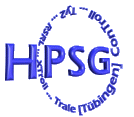
-
Complete Catalogue
-
Thematic Catalogues
-
HPSG Home page
-
The Library Online Project
-
Contact
|
|
Welcome to the Tübingen HPSG Library!
You have just entered the complete online library of all HPSG
literature written at the SfS over the last decade. In several
catalogues we have collected all available references to manuscripts,
papers, articles, and books that have been written by members of the
Tübingen HPSG community. The idea of this bibliography and library is
to make access easier to all of the papers that are usually hard to
locate, either because they were published in hard-to-find tech reports
and conference proceedings or remained unpublished, although they were
occasionally cited in literature. This bibliography also serves to give a
comprehensive overview of all the literature on HPSG written in
Tübingen. You will find downloadable electronic versions of all papers
that are available to us and are not protected by external copyright;
links to abstracts of the papers; and, wherever possible, links to the
homepages of the authors. The Tübingen HPSG Library is the best place
on the Internet to go, if you are looking for papers on HPSG by
Tübingen authors.
How to use the library
The Tübingen HPSG Library consists of a complete alphabetical
catalogue, a graphical overview table of the available thematic
catalogues, and a set of thematic catalogues, which are again ordered
alphabetically. The format of all catalogues is the same, which means
that all available additional functions are the same in each
catalogue.
Thematic Catalogues
The thematic catalogues are then grouped into four main categories:
"Linguistic Theory", "Feature Logic", "Computation", and "Reports and
Theses". Each category has several headings, which might in turn have
more sub-headings. In general, a paper can occur under more than one
category or heading. It is important to note that a heading might not
contain all papers in its sub-headings; conversely, the sub-headings
are not an exhaustive compilation of the papers in the main heading.
This is also true for the relationship between categories and
headings.
The key ideas of our categorization can best be understood by
considering a few examples. The category "Feature Logic" contains all
papers of the complete bibliography that make a substantial
contribution to the topic of feature logic. The headings of "Feature
Logic" are "SRL" and "RSRL". However, "Feature Logic" covers a much
broader range of topics than papers on these two particular varieties
of feature logic. Naturally, there are papers under "Feature Logic"
which neither occur under "SRL" nor under "RSRL". On the other hand,
there are papers in "RSRL" that are not listed under "Feature Logic".
For example, Adam Przepiórkowski's dissertation is about Polish
syntax, but large parts of it are formalized in RSRL. Adam's
dissertation is thus an important contribution to the RSRL literature,
showing with many concrete examples, how RSRL is applied in linguistic
theorizing; therefore "RSRL" is a natural heading for his
dissertation, although it would be misleading to list his work under
the category of "Feature Logic".
Additional Functions in the Catalogues
Each catalogue is divided into two columns. The right column contains
an alphabetical list of papers. The format of the bibliographic
entries follows a standard Bibtex style of Latex. For each entry in
the right column, there is a citation key in standard citation format
(e.g., [Kepser, 2001]) in the left column. Under each citation key you
find up to six clickable icons that provide additional functions for
the paper:
 |
Go to a separate page containing a complete Bibtex entry of the paper
for pasting it into your own Bibtex file |
 |
Download the paper in postscript
format |
 |
Download the paper in gzipped
postscript format |
 |
Download the paper in PDF
format for Acrobat Reader |
 |
Go to a webpage with an abstract of
the paper or with additional information on it |
 |
Go to the homepage of the first
author |
Character Encoding
Our catalogues are encoded in the international UTF-8 character set,
which supports a wide range of special characters. The most recent
releases of the most frequently used browsers, including Mozilla,
Netscape, and Explorer, support this format without requiring any
special settings. If you are using an older browser, however, you
might not be able to see non-standard characters displayed
correctly. For example, older versions of Netscape (4.x) display them
as question marks. If you experience difficulties, we suggest
upgrading to a newer browser.
How to create your own online libraries
Would you like to create your own online library from your favorite
Bibtex files that you have been using for years? We can help you! We
have developed a software package that allows you to create an online
library like ours with almost no effort, provided you have a Bibtex
file containing the entries that you would like to see in your online
catalogues. Following the link "The Library Online Project" on this
page you find a description of the software package and links for
downloading the source files.
|